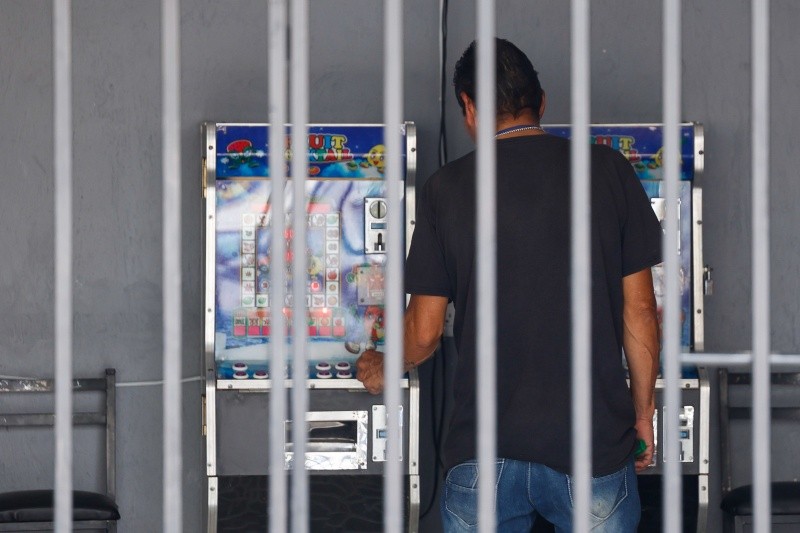Warning of clandestine mini-casinos in the Metropolis

In various neighborhoods of the Guadalajara Metropolitan Area, it's common—although illegal—to find slot machines. They're usually found at the entrances to businesses such as corner stores, stationery stores, and wine shops, among others.
However, what's attracting attention are what have become clandestine mini-casinos, establishments where these types of machines proliferate. They're no longer just video game machines or those where you receive a toy upon inserting a coin of a certain amount. Now, they're spaces where children and adults, loaded with junk, bet on whether the rotating light on the board will land on an apple, a watermelon, a star, a bell, or the top prize.
One of these spaces is the clandestine casino located on Avenida del Arroyo and Diamante Street in Arenales, Tapatíos. Next to the Arroyo Seco, the place opens at 9:00 a.m. and closes at nightfall. Inside, there are more than 15 slot machines with betting costs of one, five, and 10 pesos per spin; the prize amount awarded depends on the coin's value.
Upon arrival, there are more than six "workers" inside, who are responsible for overseeing the operation of the machines. Some exchange coins or bills for odds and ends, others supervise players' cheating or what they're watching on their cell phones, while still others are in charge of cleaning the machines and giving them a couple of blows if they've swallowed gamblers' coins.
Read: Justice Department to question Ghislaine Maxwell in Epstein caseOn the site it does not matter whether you are a minor or not, You can enter as long as you are going to spend the coins. There are at least a dozen benches so you can sit on them and gamble at your leisure without getting tired from standing there waiting for "it to burst."
That's what they call slot machine prizes. Each bet increases the amount of the machine's "jackpot," which averages between 200 and 600 pesos. It "bursts" when the machine delivers that jackpot, and then resets. You never know when it's going to drop. Among the "employees," you hear that a woman won it this morning for one peso, but "yesterday" another man won it after sitting for an hour gambling.

It's difficult to know how much money is in circulation. In one hour, a single man deposited more than 300 pesos into several machines, betting on them simultaneously. Yes, he got intermediate prizes, albeit smaller ones, of ten or twenty pesos, but the periods of inserting coins were longer than the frequency of winning.
But that's not all. Like a regular casino, alcohol is also consumed inside. The managers of the underground gambling center are close to the wine bar next door—where, incidentally, there are also slot machines—so they can bring in any cans of beer needed.
“Is anyone else going to order?” one of the “workers” at the site can be heard saying before the next “cooperator” comes to order.
Find out: "Hachiko de Culiacán" rescued, the dog that waited for its murdered ownerThere's no distinction: women, men, young people, and adults; I could almost bet the lady next to me had finished her errands before heading out to the casino to gamble.
Slot machines are prohibited by the Federal Gaming and Lottery Law . However, these are not just illegal machines; according to experts, they go further, affecting people's social and mental environments.
For example, Francisco Jiménez Reynoso, an academic at the University of Guadalajara, explained that These types of sites are commonly established in areas where there are social, economic, and structural deficiencies, becoming places that give people a false sense of fun, but also false hopes of obtaining the missing resources.
"Mrs. Juanita sits down hoping that this time she's going to win, and she goes and throws in the coins she found or set aside to gamble and see if she wins," he said.
Jiménez also commented that, although it has been an open secret until now—because authorities have been reluctant to delve deeper into investigations into this type of business—it has also come to be operated and controlled by organized crime, as just another "business" for these groups.
Furthermore, he said, not only is the safety of adults at risk, but also that of minors, who have no restrictions on entry and coexist in these gambling and alcohol-fueled environments.
Check out: Jaime Enrique Michel Velasco Foundation seeks to highlight the situation faced by older adults."Children and young people arrive and sit down to play on these machines, leaving them vulnerable to other things happening. These minors are children of single mothers, from families whose contexts mean their parents aren't home because they have to work all day, and from there, criminals can co-opt them because they know what time they arrive, how much they play, how much they spend, what time they leave, making them vulnerable not only to developing gambling addiction, but also to starting to drink or use drugs ," the specialist noted.

These types of spaces have also been identified in the area of the Mercado Alcalde in Guadalajara, as well as in the vicinity of San Agustín in Tlajomulco, without considering the rest of the autonomous vending machines that are observed in different neighborhoods of the Metropolis, from Las Mesas in Zapopan, passing through Rancho Nuevo in Guadalajara, and even Santa Anita in Tlaquepaque.
And this persists despite the fact that, just during the current municipal administration - which began last October - The various municipalities in the ZMG have managed to remove at least 352 slot machines of this type from the streets.
Look: Did Gorillaz sing in Spanish? This is the single very few remember.*Stay up to date with the news, join our WhatsApp channel .
AO
informador





